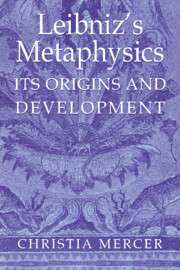Book contents
- Frontmatter
- Contents
- Acknowledgments
- References to Leibniz's works
- Introduction: first truths and half truths
- PART ONE METAPHYSICS OF METHOD
- PART TWO METAPHYSICS OF SUBSTANCE
- PART THREE METAPHYSICS OF DIVINITY
- PART FOUR METAPHYSICS
- 7 Matter, passivity, and panorganic vitalism, 1670–71
- 8 Phenomenalism and Preestablished Harmony, 1671
- 9 Preestablished Harmony, late 1671–early 1672
- 10 Final steps toward the mature philosophy, 1672–79
- Conclusion: the truth behind the First truths
- Appendix I (Not exactly) First truths
- Appendix II Leibniz's original assumptions
- Bibliography
- Index Locorum
- Index
10 - Final steps toward the mature philosophy, 1672–79
from PART FOUR - METAPHYSICS
Published online by Cambridge University Press: 12 March 2010
- Frontmatter
- Contents
- Acknowledgments
- References to Leibniz's works
- Introduction: first truths and half truths
- PART ONE METAPHYSICS OF METHOD
- PART TWO METAPHYSICS OF SUBSTANCE
- PART THREE METAPHYSICS OF DIVINITY
- PART FOUR METAPHYSICS
- 7 Matter, passivity, and panorganic vitalism, 1670–71
- 8 Phenomenalism and Preestablished Harmony, 1671
- 9 Preestablished Harmony, late 1671–early 1672
- 10 Final steps toward the mature philosophy, 1672–79
- Conclusion: the truth behind the First truths
- Appendix I (Not exactly) First truths
- Appendix II Leibniz's original assumptions
- Bibliography
- Index Locorum
- Index
Summary
When Leibniz went to Paris in 1672, he was on a secret diplomatic mission for the Baron Johann Christian von Boineburg of Mainz. Leibniz and his employer sought to maintain peace in Europe despite the aggressive intentions of Louis XIV. When Leibniz reached Paris in March 1672, England had already declared war on Holland; France would do so within the week. By the time Leibniz had settled in the French capital, political peace in Europe was no longer attainable. But the young man remained in Paris to pursue philosophical peace instead, and as a means to that goal, to educate himself as thoroughly as possible. It is striking that in 1676, after a period of enormous productivity, he struggled to stay in Paris, arguing that his pursuit of science in the service of humanity could be better achieved there than in the court of Hanover, whose duke had recently employed him.
During the four years Leibniz spent in France, his intellectual energies were focused primarily on mathematical and technical problems. The results include the construction of a calculating machine that was successfully demonstrated in early 1675 and the invention of the calculus in the autumn of that year. However, despite his overriding concern with such projects, Leibniz did not neglect the metaphysical system that he worked so hard to develop during the period 1668–early 1672.
- Type
- Chapter
- Information
- Leibniz's MetaphysicsIts Origins and Development, pp. 385 - 461Publisher: Cambridge University PressPrint publication year: 2001



